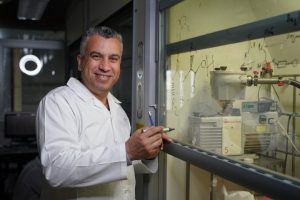
European Research Council Advanced Grants Won by Technion Professors Ashraf Brik and Amit Meller
Article by Israil Institute of Technology, published on Technion.ac.il on April 15, 2019.

(Photo courtesy of Israil Institute of Technology)
Profs. Ashraf Brik and Amit Meller of Technion-Israel Institute for Technology in Haifa have won prestigious European Research Council (ERC) Advanced Grants from the European Union’s Framework Research Program Horizon 2020.
The grants for breakthrough innovation in research are in the Advanced Grant category — a maximum grant of € 2.5 million each, awarded to leading researchers with unprecedented research achievements over the past decade.
Prof. Ashraf Brik of the Schulich Faculty of Chemistry will receive his grant for the development of innovative technology for the synthesis, delivery, and activation of synthetic proteins in the living cell. He completed his MSc and Ph.D. degrees at Technion. After an impressive career at Ben-Gurion University of the Negev in Beersheba, he joined Technion’s Chemistry Faculty.
Prof. Brik has won numerous awards including the Humboldt Prize (Germany), the Yoshimasa Hirata Award (Japan), the Tetrahedron Young Investigator Award, the Eli Hurvitz Prize (Israel) and the Israel Chemical Society Prize for Outstanding Young Scientist. He was recently elected a member of the Israel Young Academy.
Prof. Brik has developed innovative methods for creating (synthesizing) artificial proteins with desirable characteristics. These proteins are used in structural, biochemical, biophysical and functional analyses.
Prof. Amit Meller of the Faculty of Biomedical Engineering received his grant for the development of an innovative system for mapping the proteome – the complex repertoire of proteins in the cell – at the level of the single protein molecule. Prof. Meller joined the Technion following an illustrious academic career at Harvard and Boston Universities. He is a member of the Russell Berrie Nanotechnology Institute (RBNI) and the Lokey Center for Life Sciences and Engineering at Technion. Prof. Meller received and directed a multi-year grant from the Israeli Centers of Research Excellence (I-Core) in the field of living-cells physics. He has won numerous awards including the Diane Sherman Prize for Medical Innovations and the Mérieux Grant for the Advancement of Medical Research.
Prof. Meller is among the first developers of single DNA molecule sequencing technology using nanopores – a technology relevant to a range of essential medical applications. The grant is expected to promote its use for mapping all proteins in the cell.
ERC grants are awarded under Horizon 2020 – the EU Framework Research Program, which supports outstanding research activities, especially interdisciplinary research, and allocates grants in three categories – the ERC Starting Grant, the ERC Consolidator Grant, and the ERC Advanced Grant.
ERC representative Carlos Moedas said the grant was given to researchers, “for their pioneering work, which has the potential to change our daily lives and provide solutions to some of the important challenges we face.”
